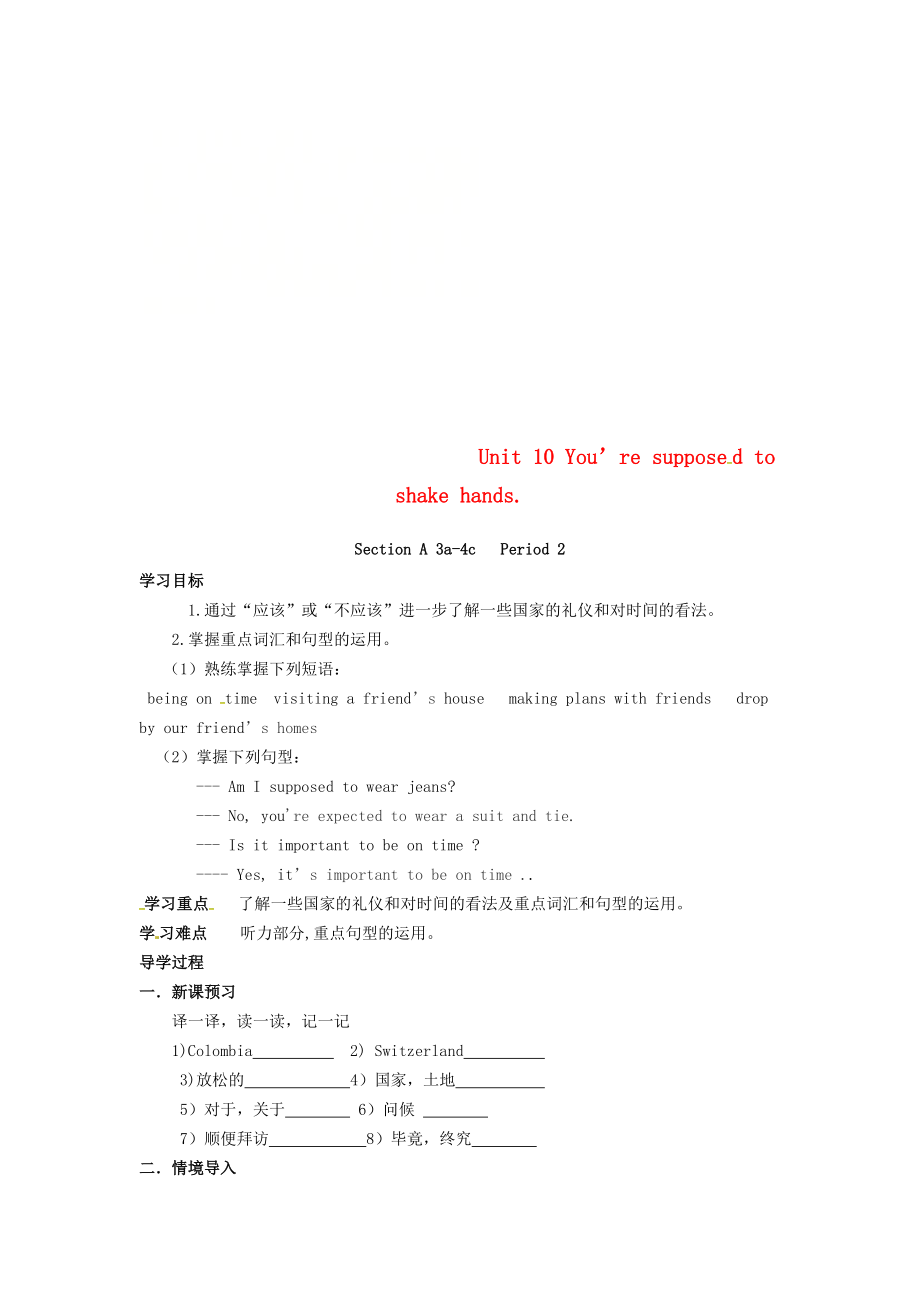《山西省運(yùn)城市垣曲縣九年級(jí)英語(yǔ)全冊(cè) Unit 10 You’re supposed to shake hands Period 2 Section A3a4c學(xué)案無(wú)答案新版人教新目標(biāo)版》由會(huì)員分享����,可在線閱讀,更多相關(guān)《山西省運(yùn)城市垣曲縣九年級(jí)英語(yǔ)全冊(cè) Unit 10 You’re supposed to shake hands Period 2 Section A3a4c學(xué)案無(wú)答案新版人教新目標(biāo)版(3頁(yè)珍藏版)》請(qǐng)?jiān)谘b配圖網(wǎng)上搜索����。
1、
Unit 10 You’re supposed to shake hands.
Section A 3a-4c Period 2
學(xué)習(xí)目標(biāo)
1.通過(guò)“應(yīng)該”或“不應(yīng)該”進(jìn)一步了解一些國(guó)家的禮儀和對(duì)時(shí)間的看法�����。
2.掌握重點(diǎn)詞匯和句型的運(yùn)用。
(1)熟練掌握下列短語(yǔ):
being on time visiting a friend’s house making plans with friends drop by our friend’s homes
(2)掌握下列句型:
--- Am I supposed to wear jeans?
--
2��、- No, youre expected to wear a suit and tie.
--- Is it important to be on time ?
---- Yes, it’s important to be on time ..
學(xué)習(xí)重點(diǎn) 了解一些國(guó)家的禮儀和對(duì)時(shí)間的看法及重點(diǎn)詞匯和句型的運(yùn)用�。
學(xué)習(xí)難點(diǎn) 聽(tīng)力部分,重點(diǎn)句型的運(yùn)用。
導(dǎo)學(xué)過(guò)程
一.新課預(yù)習(xí)
譯一譯��,讀一讀��,記一記
1)Colombia 2) Switzerland
3)放松的 4)國(guó)家�����,土地
3��、
5)對(duì)于�����,關(guān)于 6)問(wèn)候
7)順便拜訪 8)畢竟����,終究
二.情境導(dǎo)入
1,播放 2a的聽(tīng)力,讓學(xué)生說(shuō)出 Maria在美國(guó)朋友家吃晚飯所犯的的錯(cuò)誤���。
三. 合作探究
(一) Role-play a conversation between Maria and Dan.
(二) 快速閱讀3a ,回答下列問(wèn)題��,并完成表格�����。
1. In which country is it OK to be 15 minutes late for dinner? ___________________
4���、__________________
2,After reading the passage ,complete the chart.
Ideas and customs about
Colombia
Switzerland
being on time
visiting a friend’s house
making plans with friends
(三)熟讀文章,然后背誦本文�。
(四)角色扮演。小組合作先完成課本上的表格里的內(nèi)容�����,再進(jìn)行對(duì)話表演�����。
(五)翻譯并理解 Grammar focus�����,進(jìn)一步向?qū)W生
5����、講解本單元的目標(biāo)語(yǔ)言����。
(六)鞏固所學(xué)的Grammar focus的知識(shí)����,小組合作完成 4a 4b ,并討論核對(duì)答案。
四.點(diǎn)播總結(jié)
1. Where I’m from, we’re pretty relaxed about time. 在我的國(guó)家�,我們對(duì)時(shí)間的要求非常寬松。
1)“Where I’m from”, “在我來(lái)的地方”�����,是地點(diǎn)狀語(yǔ)從句���。地點(diǎn)狀語(yǔ)從句是指用一個(gè)句子作主語(yǔ)的地點(diǎn)狀語(yǔ)�����,常由連詞where引導(dǎo)����。如: I found my pen _______________. 我在丟失鋼筆的地方找到了它��。
2)relax v. “使……放松”. 形容詞為修飾物的______
6、___和修飾人的__________. 如:
Soft music is a kind of _________music, and it often makes me __________.
2. Spending time with family and friends is very important to us.花費(fèi)時(shí)間和家人��、朋友在一起是對(duì)于我們來(lái)說(shuō)是很重要的�����。
1) “spending time with family and friends”是動(dòng)名詞短語(yǔ)作主語(yǔ)���。動(dòng)名詞短語(yǔ)作主語(yǔ)謂語(yǔ)動(dòng)詞用_______ 數(shù)��。如:在陽(yáng)光下看書(shū)對(duì)眼睛不好。_____ ____the sun
7�����、______bad for your eyes.
2) sth. be important to sb. 謀事對(duì)某人重要����。如:
學(xué)好英語(yǔ)對(duì)我們來(lái)說(shuō)是很重要的。 .
3. We often just drop by our friends.我們只是順便拜訪一下我們的朋友����。
1)drop 作名詞是“ 滴,水滴”�。如:一滴水 ___________.
2) 作動(dòng)詞是“滴下,落下,放棄”�。如:不要放棄數(shù)學(xué),因?yàn)樗苤匾?
Don’t ________math, for it is ver
8���、y _________.
3)詞組歸納:drop by/in __________ = __________ , drop behind _________ , drop off _______
4. We’re the land of watches, after all. 畢竟����,我們是鐘表的王國(guó)�。
1)watch作名詞時(shí),“表”��,其復(fù)數(shù)為_(kāi)_________; 作動(dòng)詞時(shí)���,意為_(kāi)________.
2)after all “畢竟���,終究”. 置于句首,提示或強(qiáng)化可能被忽略的事實(shí)或論點(diǎn)���,作為說(shuō)服對(duì)方的理由��;置于句末�,表示語(yǔ)氣上的轉(zhuǎn)折����。如: (1)我們應(yīng)該努力學(xué)習(xí)�,畢竟我們不再是孩子了�����。
9���、
We’re _______to ________hard. _______ _______��,We’re _________ ________ children.
(2)我累了��,然而我終于到家了����。I was _____, _______ I got home ______ ______.
五. 訓(xùn)練反饋 (每題2分)
(一)..根據(jù)句意及首字母提示完成單詞
1���, He usually make P___ _to see friends.
2, If you want to g____ teachers, you are supposed to say “good mornin
10�����、g”
3���,In Colombia, we often just d_____ by our friends’ home
4��, Switzerland is the l____ of watches
5�,They have different ideas about the attitude t______ being on time .
6,You are s ______ to finish your homework before you watch TV.
7����,.Switzerland is the l ______ of watching and pe
11、ople there are serious about time.
8����, You are supposed to s ______ hands when you meet your friends.
9,On Christmas Day people g _____ and hug each other when they meet.
10����,Why don’t you say anything? Your attitude t ______ this matter is important to us.
6EDBC3191F2351DD815FF33D4435F3756EDBC3191F2351DD815FF33D4435F3756EDBC3191F2351DD815FF33D4435F3756EDBC3191F2351DD815FF33D4435F3756EDBC3191F2351DD815FF33D4435F3756EDBC3191F2351DD815FF33D4435F375
 山西省運(yùn)城市垣曲縣九年級(jí)英語(yǔ)全冊(cè) Unit 10 You’re supposed to shake hands Period 2 Section A3a4c學(xué)案無(wú)答案新版人教新目標(biāo)版
山西省運(yùn)城市垣曲縣九年級(jí)英語(yǔ)全冊(cè) Unit 10 You’re supposed to shake hands Period 2 Section A3a4c學(xué)案無(wú)答案新版人教新目標(biāo)版

